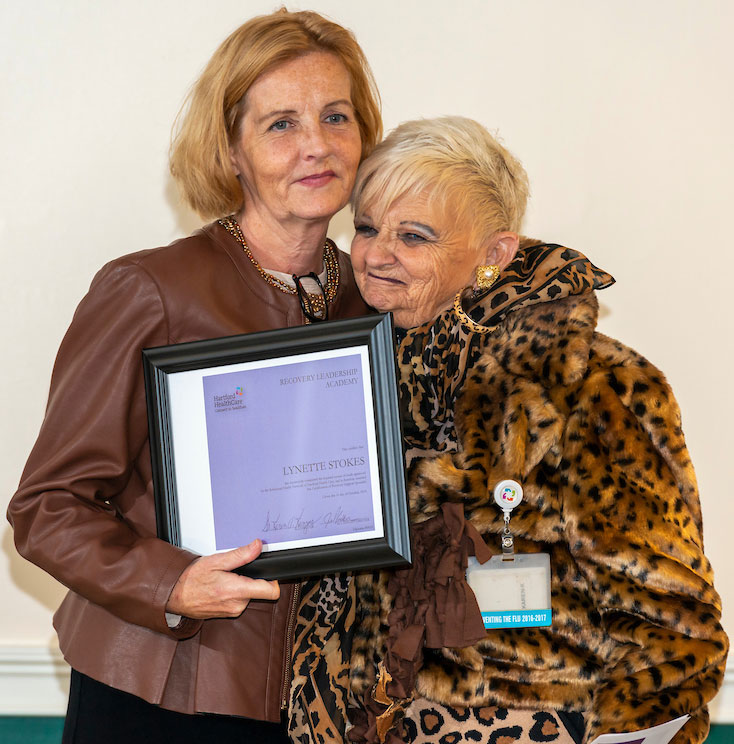By Kate Carey-Trull
Lyne Stokes, a former teacher in Hartford Public Schools, was in a severe depression this summer when she reached out to her friend Karen Kangas and found out about the Recovery Leadership Academy.
“I was in a dark place in my life at the beginning of the summer,” she said “I was stunned at what I learned from others in the class. I want to thank you all for teaching me about humanness. They saved my life with their truth.”
She was a recovering alcoholic and had been sober for 14 years when she had surgery in 2004, and was given opioids for her pain, without knowing how addictive they were. Now, she has been sober again for 14 years.
Stokes will be working in Recovery Support as a teacher for students ages 18 to 25.
She participated in the graduation for the Recovery Leadership Academy Oct. 11 at the Institute of Living in Hartford. Thirteen students graduated from the 80-hour certification program. The program was taught by Karen Kangas, Director, and Joe Voelker, instructor. This is the first class for the program offered directly through Hartford HealthCare.
About 45 attended the event, some graduates brought their children, others were accompanied by their parents or friends. All 13 graduates spoke, some becoming emotional while thanking their classmates and teachers.
Voelker wore a purple shirt and matching purple sneakers, which he said the class had voted on. Purple is also a color signifying recovery, and Stokes brought deep purple irises for everyone in the class and those who had spoken as part of the curriculum.
Voelker said the peer support is an essential part of the program, and the curriculum was designed to force the participants to think deeply.
“I’m so proud of you,” he said. “Peer support is so important for people in recovery.”
The Hartford HealthCare Behavioral Health Network Recovery Support Specialist Training and Certification Program prepares people in recovery from a psychiatric or substance use disorder, or family members of people in recovery to take an exam to become a certified Recovery Support Specialist (RSS).
Recovery Support Specialists work in behavioral health systems across the state using their own experience with recovery to support those seeking or currently receiving treatment for mental illness or substance use.
Pat Rehmer, President of the Behavioral Health Network, said people in recovery bring something to the table that other staff cannot.
“I’ve seen it over and over, and now research is proving it works as well,” she said. “People can and do recover and people who are in recovery can help.”
Dr. John Santropietro, Physician in Chief, spoke after the graduates shared their stories.
“You are going to change the world in ways I can’t,” he said. “The idea of learning and teaching each other how to be human is so important.”
Nurse Cheryl Womack works in the state Department of Mental Health Addiction Services, wanted to take the class to be a Recovery Support Specialist as well as continuing to be a clinician. She said she has suffered trauma and substance abuse and others have approached her to share their stories.
“It is OK to share your story, let people know it is OK to not be OK,” she said.
She said it is important to reduce discrimination by being open about your own experiences.
Some graduates are employees at CHR, a behavioral healthcare provider for children, families and adults whose lives have been touched by mental illness, addiction or trauma. Others will work at Hartford HealthCare.
Mark Allen, from the American Jobs Center, spoke at the end of the ceremony.
“You are no longer the student, you are now the teacher,” he said. “Find someone in the darkness and be the light for them.”
He said due to the nature of their history, it can be hard for people in recovery to find credible jobs, so a program like this offers them employment options. He recommends people for the program and helps them find jobs with their new credentials.
Jackie Rodriguez attended the graduation and had been through a similar program with Ms. Kangas. She has now been working in the field for eight months.
“I had a bachelor’s degree, but I learned more from this program,” she said. “It was very profound.”
The next Recovery Leadership Academy session will be held early next year. Night classes will be offered Jan. 7 through March 26, Tuesdays and Thursdays from 5-9 p.m. If you have any questions, contact Karen Kangas at 860.545.7536 or Karen.Kangas@hhchealth.org.
For more information on Recovery Leadership Academy, click here.


